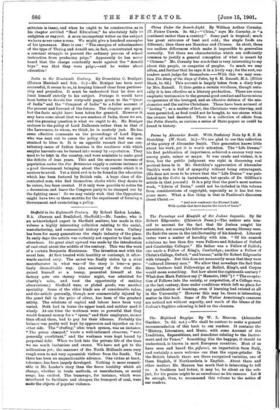India in the Nineteenth Century. By Demetrius C. Boulger. (Horace
Marshall and Son. Gs.)—Mr. Boulger has been most successful, it seems to us, in keeping himself clear from partisan- ship and prejudice. It must be understood that he does not limit himself strictly to his subject. Perhaps it would have been better to devote the sixty-odd pages given to the " Quest of India" and the "Conquest of India" to a fuller account of the present and forecast of the future. The chapters are good ; but the facts might have been taken for granted. However it may have come about that we are masters of India, there we are, and the pressing question is what we ought to do. Mr. Boulger inclines to the policy of Lord Dalhousie rather than to that of the Lawrences, to whom, we think, he is scarcely just. He has some effective comments on the proceedings of Lord Ripon, who was sent out to curse the policy of action but was con- strained to bless it. It is an apposite remark that one con- tributory cause of Indian famines is the readiness with which surplus harvests can be turned into money by exportation. They used to be kept in the country, and were available to make good the deficits of lean years. This and the enormous increase of population under the Pax Britannica supply a curious instance of a good Government bringing about the very results which it is anxious to avoid. Yet a third evil is to be found in the education which has been fostered by British rule. A huge class of dis- contented men, who find themselves clerks while they desire to be rulers, has been created. If it only were possible to retire for a decennium and leave the Congress party to be stamped out by the fighting races ! So we may vainly wish that the Opposition might have two or three months for the experiment of forming a Government and enunciating a policy.










































 Previous page
Previous page